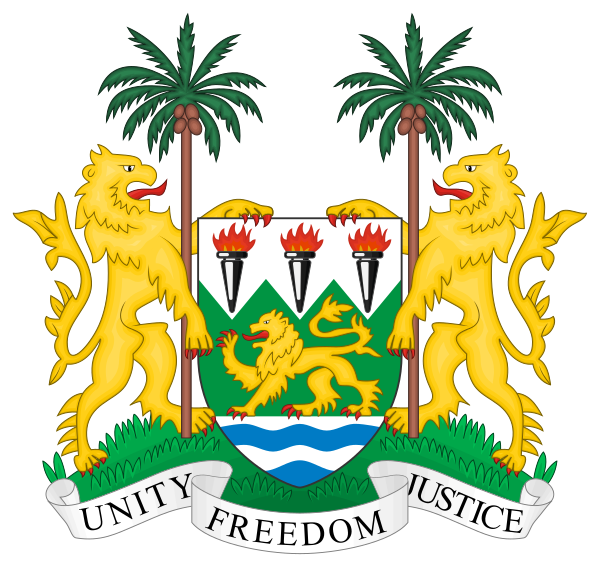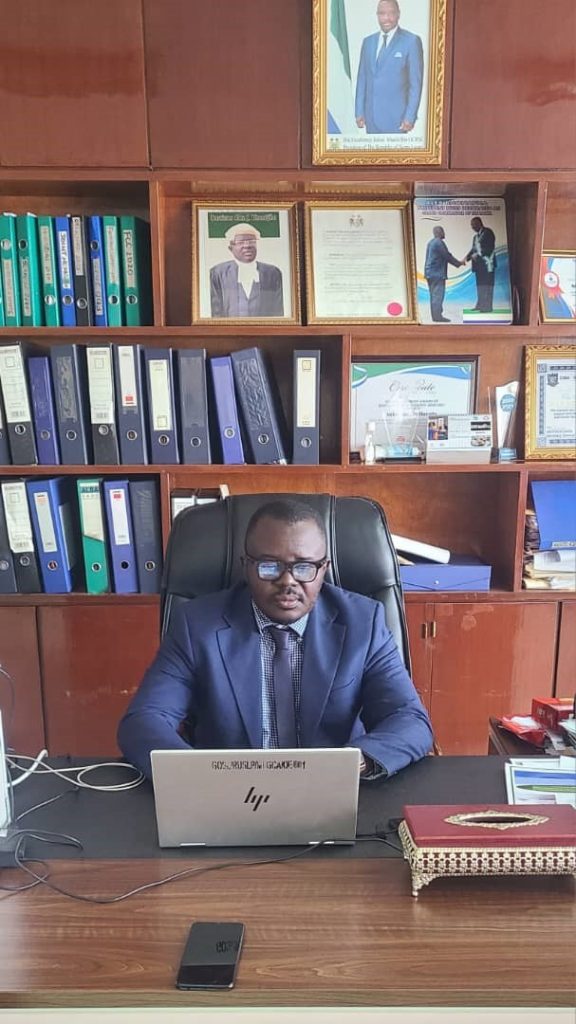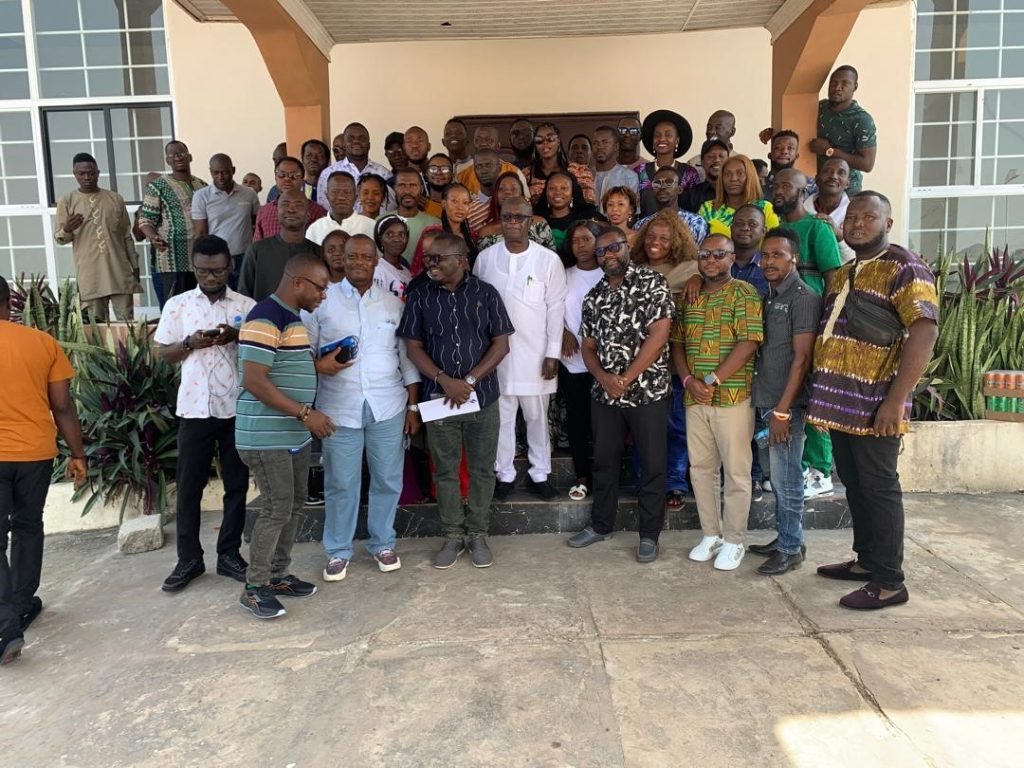

is the Director of the Decentralization Secretariat. He was appointed to this position on the 17th of September 2018. Part of his cardinal responsibilities include: providing technical back stopping to the ministry responsible for Local Government and Community Affairs, ensuring that the process of decentralization is driven forward and the President’s commitment on decentralization in his manifesto is achieved. He deals with policy issues of the ministry as well as legislation.
Director Bhonapha is a seasoned Local Governance Practitioner with empirical knowledge in the administration of local councils. He has undertaken so many consultations for reputable institutions on gender and children’s issues. He was the Chairman of the Kailahun District Council from 2012-2017.
He is a Barrister and Solicitor of the High Courts of Sierra Leone. He is also an Associate Lecturer at Njala University since 2010.
Mr. Bhonapha holds a Bachelor of Arts Degree in English and Sociology, (B.A.), a master’s degree in Sociology, a bachelor’s degree in law with honors L.L.B. (Hons.), a Bachelor of Laws from the Sierra Leone Law School (B.L.) and a Master’s degree in Development (M.A.)
He remains the youngest recipient of the highest Rokel Order. He was decorated as Grand Commander of the Order of the Rokel (G.C. O.R.) on behalf of Sierra Leone Students in 2007. He is a Justice of Peace. (J. P.) He is a faithful worshiper of God as a Christian. He is married to Mrs. Mojama Dabisatu Alex Bhonapha and they have four children. The Director of the Decentralization Secretariat in Sierra Leone is responsible for driving forward the decentralization process and providing technical support to the Ministry of Local Government and Community Affairs
Decentralization policy
Sierra Leone’s decentralization policy aims to make public services more equitable and inclusive across the country. This policy devolves responsibility for many government functions to the Local Council level.
THE ROLES AND RESPONSIBILITIES OF THE DRICTOR DECENTRALIZATION SECRETARIAT OF LOCAL GOVERNMENT
THE ROLE OF DECENTRALIZATION IN LOCAL GOVERNMENT ADMINISTRATION
THEME: Deepening Decentralization in Sierra Leone
The Ministry of Local Government and Community Affairs held a two-day annual residential retreat at the Galliness Paradise Hotel in Bo. The theme of the retreat was ‘Deepening Decentralization in Sierra Leone.’. The retreat spanned from the 18th of December, 2024, to the 21st of December, 2024. The 18th of December, 2024, was the check-in date for all participants and staff of the Decentralization Secretariat. The 19th and the 20th of December, 2024, saw deliberations and presentations of the activities meant to be done at the retreat. On Thursday, the 19th of December, 2024, which happens to be the first day and the opening of the retreat, staff of the secretariat converged at the retreat hall in Galliness Paradise Hotel. Registration of participants and staff was done by Mr. John Rashid. A total of sixty (60) participants registered with appended signatories, positions, emails, and contacts on that day. Mr. Sorie Joseph Sesay, who is the District Coordinator SCARDSIL in Bombali, ensured the orderliness in the hall by calling the attention of participants to the commencement of the meeting. Prayers were done in the two most worshipped religions, Islam and Christianity. Alhaji Ousman Kargbo led the Islamic prayer, and Joseph Dauda Sevalie prayed in the Christian way. A self-introduction was done by staff, mentioning their positions and duty stations.
DEVELOPING THE LEADER WITH YOU.
National Program Coordinator for SCARDSIL, Mr. Mustapha Mohamed Korjie, gave an overview of SCARDSIL. Mr. Korjie briefly highlighted the crucial role SCARDSIL is playing in the development of rural communities. He further mentioned that SCARDSIL is not getting the required recognition for all that they are doing to cascade development in rural communities, especially in the infrastructural area.
After his brief statement, he presented on ‘Developing the leader with you.’ In his opening presentation, he asked participants who is responsible for the failure of institutions. The Managers or Leaders? At first, various definitions were given for a leader that have the same bearing. Many stated that leaders are responsible for the failure of any institution, which Mr. Korjie concurs with and justifies with their influential leadership role and guidance they are supposed to play. A whole lot of presentation was done by Korjie on leadership, ranging from the leadership perspective to the different stages in leadership
WELFARE ISSUE
Madam Hawanatu Mansaray presented on the welfare of staff at the Secretariat. She reminded everyone that it is something that has been agreed on in the last retreat before the 2024 retreat. Madam Hawanatu vented her disappointment and frustration on the snail pace and corporation staff towards the commitment of the welfare issue.
RESIDENT TECHNICAL FACILITATORS IN THE DECENTRALIZATION PROCESS
The Capacity Building Manager, Mr. John Braimah, presented on “Resident Technical Facilitators in the Decentralization Process. CBM clearly stated that RTFs were first called coaches in the inception of the decentralization process, meaning they were supposed to go and be coaches in the local councils. He requested if any RTFs were recruited during the era of a coach; none was available. You guys are taking the Director for granted because he is a politician, but I am an administrator. I’m not talking for the RTFs alone but for everybody in the Secretariat”, the Capacity Building Manager retorted. He stressed the lack of reporting by the RTFs, specifically the old ones. He singled out RTF Ishmael George of Bonthe District Council as the only RTF that is consistently sending reports to the Secretariat. He revealed to the staff how he is being queried by the minister for not seeing reports from the councils, which are meant to be sent by the RTFs. And those who are not reporting are being considered irrelevant. He stated that the lack of report writing by any staff in the early days of decentralization can lead to holding on to the paycheck of the default staff. The Capacity Building Manager revealed the reason behind the existence of the RTFs in the various local councils. After thirty years of the resuscitation of the local governance system in Sierra Leone, the then director thought it fit for the secretariat to have a field staff in all councils to do backstopping and monitor the processes of the operations of councils; that justification was sent to the World Bank and got an approval. CBM vented out his frustration about how the current RTFs are reneging on the mandate their position was established under and the frequent request of the reporting template. He categorically stated that come 2025, it is not going to be business as usual. He went on to appeal to all staff, especially the RTFs, to do their own part of the job, because this is the first time the minister is assuring the RTFs of their job ‘Twenty years down the lane, what has the RTF done in terms of capacitating the councils?’ CBM asked one of the oldest RTFs, Sullay.
STRENGHTENING THE SKILSS, RESOURCES AND ABILITY
In his next presentation he presented on the strengthening of skills, resources, and ability of staff. He highlighted the categories of skills and the various stages of skills that are essential for staff ability, organizations, and communities to perform their duties effectively and efficiently. He went on to state that resources are assets or materials for individuals, organizations, and societies to achieve goals, solve problems, and sustain operations. He pointed out that resources can be both tangible, which is the physical, and intangible, which is nonphysical. He further mentioned the types of resources, which he named as human resources, which are the skills, knowledge, expertise, and labor provided by various classes of people. Financial resources, which are money or capital investments, can be funds, grants, revenue, and other financial assets. Natural resources are raw materials or elements found in nature that can be used for economic gain. Physical resources are tangible assets, such as machinery, equipment, buildings, and technology that are used in production or service delivery. Information resources, which are data analysis, knowledge, and intellectual properties that can be. Time-limited resource
CONSOLIDATING THE GAINS
The admin officer, Mr. Johnson, presented on administration. Consolidating the gains. He started highlighting the key issues surrounding administration by citing managing people, maintaining your job, and the administration itself. He introduced the topic ‘Administration’ by defining it where he said, ‘It is a group of people with different nomenclature, holding different positions, having different functions, which is made up of administration.’ He stressed that every staff member within the administrative circle is attending the retreat because of the same goal, the same purpose, and the same direction, which made everyone a part of administration. Mr. Johnson went on to categorize administration into two folds, which are public administration and business administration. He stated that the Secretariat belongs to public administration, by looking at policies and how to implement them to make sure that the government of the day is well directed and supported, whereas the business administration looks at the private sector, business enterprises, and what they do to make sure they achieve their objectives. The admin officer cited key characteristics of administration. He pointed out the importance of collaboration amongst staff, which can make work easier for all; guidance and supervision from leaders that can give direction to do proper work; recruitment, which can occur in different forms; and managing people, which is the very difficult aspect of administration due to the different backgrounds, different locations, and tribes staff are coming from to make up the administration. He concluded by saying if all staff work hard and do their jobs diligently, the Secretariat will stand tall in Sierra Leone.
MONITORING AND EVALUATION: PRACTICES AND ADAPTATION
The Monitoring and Evaluation manager, Matilda Nyanda Kabbia, presented on the Monitoring and Evaluation: Practices and Adaptation. In her opening statement, she mentioned that a key mandate of the Secretariat is to monitor the capacity of the council and to support them. The manager highlights the use of M&E packages, which are software packages that are vital for the M&E, RTFs, and even the managers in analyzing information and monitoring projects.
The M&E manager emphasized that too many technicalities are not a requirement to do the M&E job, but checks and balances can be of use in the process of monitoring. She went on to highlight some of the impediments in carrying on M&E activities, like overemphasis of accountability and overlearning, insufficient funding and resources, and no allocation in the budget for monitoring.
GENDER MAINSTREAMING: LOCAL GOVERNANCE APPROACH
The Gender Officer, Josetta Campbell, presented on the mainstreaming of gender in the local governance approach. In her opening presentation, she vehemently stated that there should be a balance between the two genders in occupation or employment, and also that the 30% minimum quota representation should be seen either in the workplace, politics, or political and non-political appointments. Holistically, the gender officer emphasized the mainstreaming of gender budgeting. She also talked about women’s access to finance and decision-making, which women should also be seen in doing.
She made it known to everyone about the dominance of the male gender in leadership positions at the Secretariat. The gender officer advocated for more women to be seen in leadership positions come 2025.
In her conclusion message, she referenced the Gender Officers in the twenty local councils to be asked any gender questions when anyone deemed it necessary.

